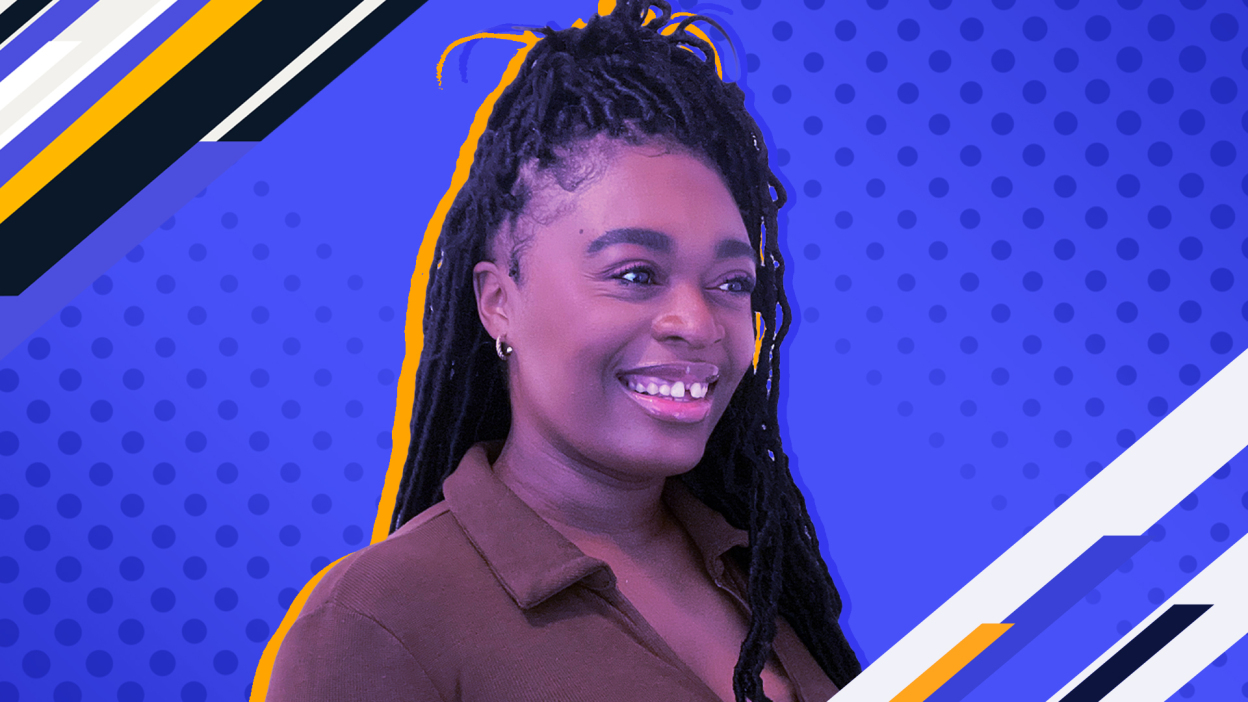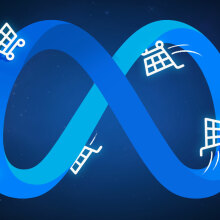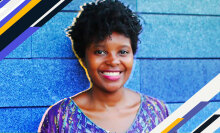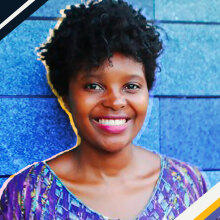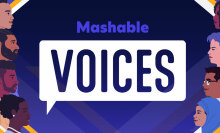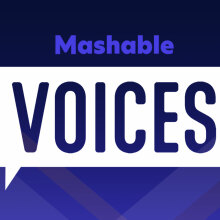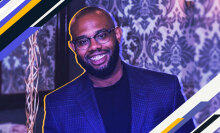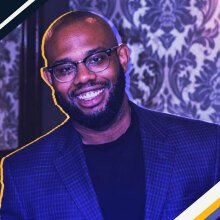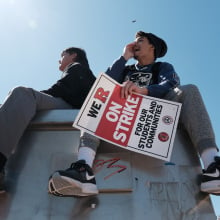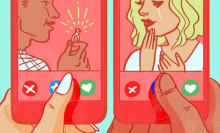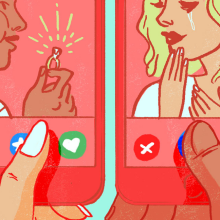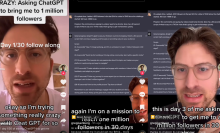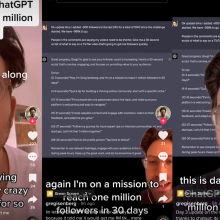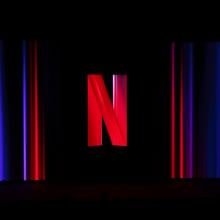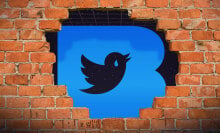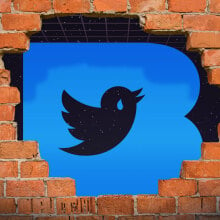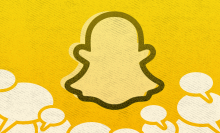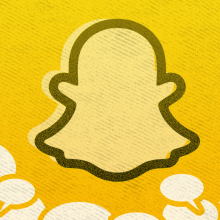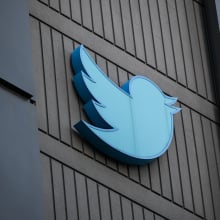When I decided to learn how to code in 2017, I was surprised — not just by how much I enjoyed the creativity involved, but even to find myself working toward becoming a software engineer. It was a complete turn of events for me, as someone who had been pursuing a career as a psychodynamic therapist, and I was so proud to begin sharing my progress on social media.
As I detailed my journey online, I recognized a sense of community building as people began following me, someone with whom they identified — a Black, queer, and neurodivergent woman — in a field where that’s rare. Black women only make up 0.7 percent of the technology workforce in the UK(opens in a new tab), with even fewer also identifying as neurodivergent and/or queer.
My goal is to inspire and empower those who identify with any or all areas of my intersectionality to get into the tech industry, and to do so, I use the most powerful and accessible tools at my disposal: my voice, my story, and social media.
Sharing my intersectionality
As a DevOps engineer, multi-award-winning neurodiversity and inclusion advocate, writer, public speaker, and the founder of The Opal Company, I use my platforms(opens in a new tab) to promote education on topics related to neurodiversity, inclusion, and tech, including understanding intersectionality.
A term coined by civil rights advocate Kimberlé Crenshaw(opens in a new tab), intersectionality describes the complex, cumulative way the effects of multiple forms of discrimination overlap and impact marginalized individuals. In creating an amalgam of identities that is more than the sum of their parts, intersectionality shapes perception — how you experience the world, judgments held against you, and how you influence others.
Throughout my life, I have always been reminded of my Blackness, even more so upon entering the tech industry. When I moved from London to Belfast for my first technical role, as a junior software engineer, I was so excited. But, after a week or two in my new position — working with about 500 people at the head office of one of the largest telecommunications companies in the United Kingdom — I came to the realization I was the only Black woman there. Suddenly, the stares when I walked into the cafeteria made sense, and I began choosing to eat on my own.
Although I was always honest and open about feeling misunderstood, I saw no changes in the company's diversity and inclusion practices. I am grateful for the individuals I did connect with — some of whom I still consider friends — but it can be exhausting and isolating to constantly feel responsible for teaching others about your identity and providing inspiration through representation. I tried to reassure myself that what I was sharing would contribute to a better experience for the next person who joined the company and looked like me.
However, the loneliness took a toll on me mentally, and I became miserable and unmotivated. Eventually, I found myself in the throes of extreme anxiety while on a Zoom call in 2021, rocking from side to side with my camera off as I tried to maintain composure. I was referred to a mental health professional for cognitive behavioral therapy and diagnosed with anxiety, which followed diagnoses of dyslexia, dyspraxia, and ADHD three years prior.
This journey eventually led me to being diagnosed as autistic just last month, coincidentally during World Autism Acceptance Week. Although I do have sadness that it took so long to identify this new area of my identity, it’s one I accept, celebrate, and am learning to embrace.
Tweet may have been deleted (opens in a new tab)
Being neurodivergent can bring gifts such as creativity, unique ways of thinking, and a desire to learn new subjects. It also can present challenges that often make it hard to explain what I need, and it hasn’t been easy progressing in my technology career in environments not designed for a neurodiverse workforce. I use a variety of accommodations, including medication and screen readers, to help me navigate my day-to-day life in and out of the workplace.
But, following my own path, I have earned multiple awards and honors, in addition to being featured in several publications, giving keynote speeches, participating on expert panels, and even co-authoring a book called The Voices in the Shadow(opens in a new tab) about Black women in tech. Most recently, I’ve been selected to serve as a United Nations Women UK delegate on the Commission on the Status of Women.
'You can't be what you can't see.'
In a world with an abundance of opinions on the many layers of my identity, I’ve come to embrace that there will be people who don't want to hear my story — but there are about 30,000 others following me online, contributing to opportunities to learn and grow, and inspiring me to continue sharing my authentic self. Ultimately, the amount of followers doesn't matter, and the amount of views doesn't matter — it’s the communities that my story does touch that matter the most.
Activist Marian Wright Edelman, founder and president of the Children’s Defense Fund, said, "You can't be what you can't see." Being neurodivergent, being queer, being a Black woman, and even being a DevOps engineer means I can be for others what I couldn't see for myself.
Tweet may have been deleted (opens in a new tab)
"I love how well you've embraced your identity, giving voices to it and by so doing, allowing others to embrace their true identity." "Stand in your power and keep moving mountains." Comments like these replies to a recent post I shared on LinkedIn about being diagnosed with autism as an adult show the sense of mutual support and purpose that drives me to continue to push for awareness and inclusion.
Building a social media presence and publicly sharing yourself with the world can be challenging, especially for those who are part of marginalized communities. However, it can be empowering — not just for you, but for those who may be motivated through your example.
Protecting your digital space
As a technologist who is a part of many marginalized identities, protecting the space I’ve claimed in my industry and on social media is critical to my achievement and my well-being — a foundational piece of being able to share my story. Although it may seem simple to some, I’ve worked to become comfortable trusting my intuition online and blocking people when it feels right.
As someone who genuinely enjoys discussing advice on getting into the tech industry, learning to code, or simply existing as a Black, queer, neurodivergent woman in the corporate world, I want to share myself freely but have been met with disrespect by those exhibiting a sense of entitlement to that degree of access. Although I have a tendency to exhibit hyperfocus in scenarios of conflict or rudeness, I’ve grown to recognize the answer is in trusting how I feel.
Instead of struggling with guilt for not offering the world the big heart my culture and society expect from me, I choose to prioritize my own well-being, and that allows me to continue excelling at doing what I love as a software engineer and as an advocate.
Although it can be overwhelming, social media plays a huge part in building your brand, establishing yourself as an expert in your field, and developing a network of support. Protecting your mental and emotional wellness and sense of self is just as important a part of managing your social media as any other, and I employ fundamental strategies to safeguard my space online:
Create a Safe Social Environment
Don't feel blameworthy for not responding to people. I used to feel guilty for not replying to a comment or a question quickly enough, at times due to my followers telling me I deserved to feel that way. As a Black woman, and even in my role as an eldest daughter, I had gotten used to always feeling obligated to be available to others at the detriment of myself. But it's important to always put yourself first.
Block Hurtful People and Don't Respond
I've blocked so many people over the years who have been sexist, racist, misogynistic, or just plain rude. At times, I felt guilty, but you never should. We can only keep the door open for those who respect it and close the door for those who don't.
Take Breaks
As a neurodivergent person, I can get overwhelmed very easily. It's in moments like these when I choose to step away from social media. You don't need to announce the social media break; you can just uninstall the apps and breathe.
Be Mindful of What You Share
Don't feel obligated to share everything about your life, location, or opinions. Your entire life does not need to be content. You can keep things to yourself. Setting boundaries is important to both your mental health and your safety. Make conscious choices about who has access to anything showing your home, and be sure to save content created while traveling for posting once you've returned safely.
Also, use tools like two-factor authentication and strong password practices to secure your social media accounts and maintain control over what is shared on your behalf. Anyone can be susceptible to being hacked, but these safeguards can help protect your digital presence.
Offering inspiration through authenticity
As I find new connections and community through my recent autism diagnosis, I encourage you to keep sharing your story and inspiring people in your corner of the internet — it makes a difference to more people than you may think. Remember, the number of followers you have or don’t have doesn't determine your impact; what is essential is remaining authentic and true to who you are as you welcome the world into your life online.
For those who can identify with any area of my intersectionality, I hope my experience encourages you to be unapologetic about who you are, and to come as you are in every space you enter.
Want more perspectives from thought leaders in tech delivered to your inbox? Sign up for Mashable's daily Top Stories newsletter.
